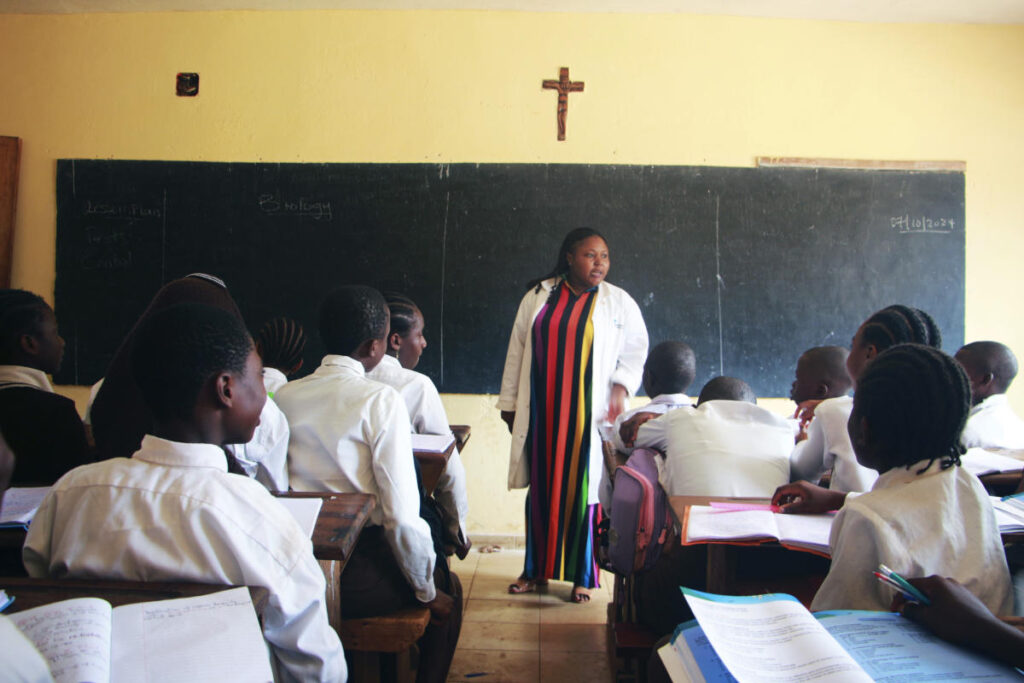Jane Ndamei, a 20-year-old student from Cameroon’s troubled southwestern region, nearly lost her life five years ago during her Grade 12 exam when armed men invaded her school, causing chaos and panic. At just 15 years old, Ndamei was among a staggering 2.8 million children in West and Central Africa whose education was halted due to violent conflicts. As of June, the United Nations reported more than 14,000 school closures across 24 countries in the region due to violence and insecurity. In 2023, the ongoing separatist crisis in western Cameroon and Boko Haram activities in the north left 1.4 million school-aged children needing educational assistance. Ndamei experienced firsthand the immediate threat to education, with armed separatist groups specifically targeting schools, resulting in 855,000 children out of school in the northwest and southwest regions by 2019, the same year Ndamei’s school was attacked.
The conflict in Cameroon began in 2017 when English-speaking separatists rose against the French-speaking majority government, seeking an independent state for English speakers. This rebellion has resulted in the deaths of over 6,000 people and the displacement of more than 760,000 individuals. In their quest for political recognition, the separatist fighters implemented a school boycott, creating a hostile environment for education by threatening, killing, and abducting both students and teachers. Schools became battlegrounds of a conflict unrelated to the aspirations of innocent children, leading to a systematic denial of education. According to Hassane Hamadou, NRC’s Regional Director for West and Central Africa, the situation has reached catastrophic levels, stealing opportunities and futures from countless youths.
Ndamei’s journey continued as she relocated to the safer French-speaking western region of Cameroon, residing with relatives to pursue her education against the odds. She is now enrolled in a university nursing program, a privilege not afforded to many of her peers. Many of her classmates have been unable to escape their circumstances and have faced dire fates. Ndamei expressed concern for those who once had dreams for the future but are now caught in cycles of early motherhood and despair. The stark reality of children being forced out of school is evident, often leading them to become young parents by the age of 11 or 12, shattering their hopes for the future and casting a shadow of frustration upon families yearning for better prospects.
Nelson Tabuwe, a displaced father from Batibo town in the northwest, has watched his three children remain out of school for nearly seven years due to the ongoing conflict. His two daughters and son had ambitious dreams—one wanted to become a mechanical engineer, another aspired to be a doctor, and the eldest wished to teach. The repercussions of the conflict have become painfully clear for Tabuwe, who fled to Yaoundé in search of safety but now lives in difficult conditions, struggling to provide for his family in a cramped, single-room apartment. The financial burden adds to the despair, with job opportunities scarce; his children contribute to the family’s income instead of pursuing their education.
For many families like the Tabuwes, life has become a daily struggle for survival. The war in Cameroon has forced countless people into displacement, forcing them to abandon their homes and hope for a stable future. The emotional toll of separation and loss is replete within these communities as aspirations fade and frustrations rise. Tabuwe’s experience, along with that of many others, underscores the broader, tragic narrative of millions of children affected by violence. Their potential, once promising, is stifled by the harsh realities of a conflict that continues to rage without resolution.
The international response to this crisis brings forth a glimmer of awareness; organizations like the Norwegian Refugee Council are focusing on providing educational assistance to those most in need. However, the road to recovery remains fraught with challenges. The statistics are staggering and often overwhelming, yet each figure represents a child with dreams and aspirations that have been dashed by circumstances beyond their control. The pleas from families echo in the desperation of community members who hope for governmental intervention and peace to restore the sanctity of education disrupted by violence. Education, seen as a foundational pillar for the future, is viewed as an unattainable dream for many.
As the situation in Cameroon continues to evolve, it is imperative for local and international stakeholders to advocate for peace and stability, ensuring that every child’s right to an education is upheld. You see, Ndamei and others like her are not just statistics; they are living testaments to resilience, hope, and dreams caught in the throes of violence. The world must listen to their stories, support initiatives that promote education, and strive for a future where such brutal disruptions to learning become a distant memory rather than a lived reality for the children of Cameroon and beyond. Failure to act means perpetuating a cycle of violence that robs generations of their potential, leading to broader societal implications that affect everyone.

